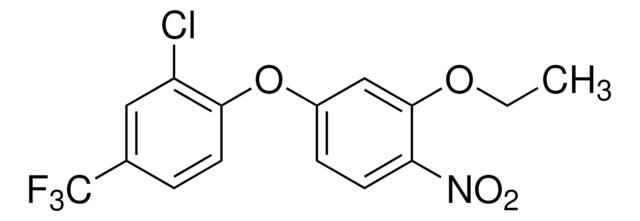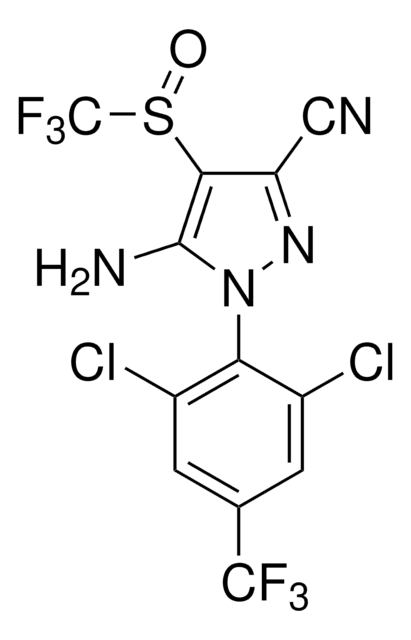37909
Metconazole
PESTANAL®, analytical standard, mixture of stereoisomers
Synonym(s):
5-(4-Chlorophenylmethyl)-2,2-dimethyl-1-(1H-1,2,4-triazol-1-ylmethyl)cyclopentanol
About This Item
Recommended Products
grade
analytical standard
Quality Level
product line
PESTANAL®
shelf life
limited shelf life, expiry date on the label
technique(s)
HPLC: suitable
gas chromatography (GC): suitable
application(s)
agriculture
environmental
format
neat
SMILES string
CC1(C)CCC(Cc2ccc(Cl)cc2)C1(O)Cn3cncn3
InChI
1S/C17H22ClN3O/c1-16(2)8-7-14(9-13-3-5-15(18)6-4-13)17(16,22)10-21-12-19-11-20-21/h3-6,11-12,14,22H,7-10H2,1-2H3
InChI key
XWPZUHJBOLQNMN-UHFFFAOYSA-N
Looking for similar products? Visit Product Comparison Guide
General description
Application
- Food and environmental matrices by high-performance liquid chromatography (HPLC) equipped with multiple wavelength ultraviolet (UV) detector.
- Fruits and vegetables by gas chromatography (GC) equipped with Q Extractive Orbitrap consisting of electron ionization (EI) source and hybrid quadrupole Orbitrap mass spectrometer.
- Chlorophyll-containing matrix by dispersive-solid phase extraction (d-SPE) and GC with tandem mass spectrometry (MS/MS).
- Honeybees as well as bee pollen samples by d-SPE followed by analyses using LC-MS/MS and GC-MS/MS and in earthworms by LC-MS/MS with electrospray ionization (ESI).
Legal Information
Not finding the right product?
Try our Product Selector Tool.
Signal Word
Warning
Hazard Statements
Precautionary Statements
Hazard Classifications
Acute Tox. 4 Oral - Aquatic Chronic 2 - Repr. 2
Storage Class Code
11 - Combustible Solids
WGK
WGK 2
Flash Point(F)
Not applicable
Flash Point(C)
Not applicable
Personal Protective Equipment
Choose from one of the most recent versions:
Already Own This Product?
Find documentation for the products that you have recently purchased in the Document Library.
Customers Also Viewed
Our team of scientists has experience in all areas of research including Life Science, Material Science, Chemical Synthesis, Chromatography, Analytical and many others.
Contact Technical Service



